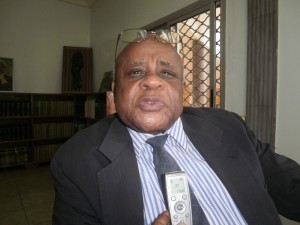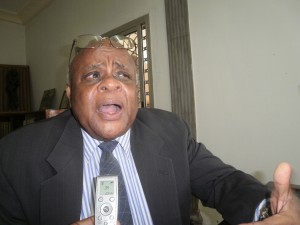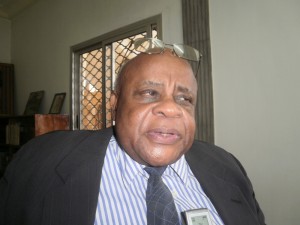Walter Wilson Nana
Buea, Cameroon
Twenty years after the holding of the All Anglophone Conference, AAC, frontline leader, Barrister Sam Ekontang Elad is still upbeat about their vision and essence. In this exclusive interview, he highlights the contributions made by his generation, the challenges of the course and the need for the younger generation to move ahead with the movement.
Excerpts:
What happened on the 2nd & 3rd of April, 1993 at the Mount Mary Health Centre?
Three of us; Dr. Carlson Anyangwe, Dr. Simon Munzu and I, who had been nominated at the Tri-partite Conference that held in Yaoundé, after the period of Operation Ghost Towns, made up the Anglophone delegation to draw and participate in the revision of the constitution of Cameroon. We had stressed on that, repeatedly, at the Tri-partite

Barrister Ekontang Elad on the Anglophone delegation to draw and participate in the revision of the constitution of Cameroon.
Conference and at the Technical Committee, which is suppose to draw up the constitution that the people of West Cameroon preferred a federal structure and constitution for our country to take care of the Francophone element and Anglophone Heritage. Members of the Technical Drawing up Committee of the constitution needed to see that what we were telling them was true. So, we decided to call all the living forces of West Cameroon; all the Fons from the Northwest, all the Chiefs from the Southwest, all the active, living forces across the country. The elderly statesmen; John Ngu Foncha, Solomon Tandeng Muna, were all present. We reported to them all that was going on in the Technical Drawing up Committee, headed by Prof Joseph Owona and to let them know there were doubts in the minds of the members of the Technical Drawing up Committee. That the issue of Anglophones preferring the federal constitution was true. These are some of the issues that led to the summoning of the All Anglophone Conference, AAC, at Mount Mary Health Centre, Buea. All the active forces of Anglophone expression across Cameroon were present. Some Francophones elements were also present.
How did the living forces of West Cameroon receive your message?
They were enthusiastic. Everybody expressed total support. They were unanimous on the idea of a federation. The resolutions adopted reflected the aspirations of the English speaking people of Cameroon.
What are some of the highlights of those resolutions?
We agreed that the country should go forward with a federal structure, but did not state whether it will be a two-state or ten-state federation. It was clear that it was two-state that was implicit. We examined the massive discrimination that the regime has consistently meted out to people of West Cameroon origin, cited that in the ten provinces, there were no Anglophone Governor; all the 54 Divisions then in the country were headed by SDOs of Francophone Expression. The four of us; Dr Anyangwe, Dr. Munzu, Hon. Benjamin Itoe and I condemned all these and reiterated that our people wanted a federation.
How did Prof. Joseph Owona and the members of the Technical Drawing up Committee of the Constitution receive your resolutions?
There was sympathy expressed and note taking of a constitution that will take care of the various components of the country. We had talked about the Anglophone system of government. In the present constitution (revised in 1996), you will find openings of an opposition in government. This was part of the issues we raised at the AAC and at the Tri-partite Conference. In the 1996 constitution, you will find elements of a loosely decentralised state. This was a timid move, made by the powers that be, to bring about a federal structure. We had an impact. We were told that the President of the Republic and his advisers thought that a federation will not be a good thing for an African country like Cameroon but there were timid moves to decentralise a centralised system like the one we have. I will point to the opposition in the parliament and the decentralised councils as part of the inputs we made at the AAC.
Do you, Dr Anyangwe, Dr Munzu & Hon. Itoe feel satisfied that you made an impact? And what obtains today, you made a contribution to it?

Barrister Sam Ekontang Elad: "We certainly made an impact. But it’s not the totality of what we would have wished for. "
We certainly made an impact. But it’s not the totality of what we would have wished for. We had espoused a system whereby the Governors will be elected, coming from their Regions of origin, but it was not taken into consideration. At the time, we said we had done something. No constitution is written in a day. The 1961 Constitution has gone through several modifications. The 1972 Constitution has been modified but I think we’ve instead moved backwards. We should give a deep thought to a federal structure.
20 years after, where are we with the AAC?
The initial verve of enthusiasm, just after the AAC has slowed down. After Buea in 1993, we were in Bamenda for the AAC2 in 1994. 1995, we carried the fight to the UN and I led a delegation of 13 eminent West Cameroonians to the UN to see Boutros Boutros Ghali to say that the terms of Reunification have not been respected and we were fortunate to have elderly statesmen like; Foncha and Muna, who came as people, to give testimony of what we were saying. That we had derailed from the objectives of Reunification. After our UN trip, there have been a remarkable slow down of the activities of the AAC. But I will say that was the task of my generation. We took the fight to the point we did. People who took over the baton are now in factions and they no longer speak with one voice. There are conflicting emotions, ideas and personal ambitions. These have hindered the progress of the AAC. You will find some single crusaders like Mola Njoh Litumbe and the various factions of the Southern Cameroon National Council, SCNC, still pursuing the fight. This is the time for the younger generation to step forward and pick up the fight. 20 years, we were burning with the desire to see a federated Cameroon. Now, we’re no longer there but we’re still ready to give all our support and see that the fight goes through. I still passionately believe that what we wished for Southern Cameroon should be enshrined in our constitution. It has not yet happen but it will someday. The fact that President Biya, out of the blues came out with this idea of celebrating 53 years of the Reunification of Cameroon is a step that it is worrying and tells the national conscience and Mr Biya himself that something should be done to enshrine the heritage of Southern Cameroons.
Ekontang Elad, Anyangwe, Munzu & Itoe are still alive, why this sudden back-out from your end in the course?
To say we’ve ‘backed out’ is not putting it accurately. Dr. Munzu was teaching at the University of Yaoundé. Shortly after the AAC, he probably lost his job. It became difficult for him to continue teaching at the university. Same fate befell Carlson Anyangwe. The two men left the country and I am happy they are working elsewhere now. Dr Munzu has an important assignment with the UN in the DRC and Dr Anyangwe is a Lecturer in Law in one of the universities in South Africa. Hon Benjamin Itoe still has ambitions of working with the regime. With such ambitions, you can understand the obvious lack of favour that affects our original goal. I am here and when I have the opportunity, I make my statements clear on the AAC, either on the radio or newspaper declarations that we’re still not there. We’re not yet there. I continue to make the appeals that something needs to be done. The generation of today is trapped in self ambitions and poverty. There is a misunderstanding of the burning spirits that moved us in the 90s. There are some, who are misguided and they are fighting amongst themselves. 20 years after, there is need for us to sit down and take stock of what happened and where we are going.
At AAC2, you talked about the ‘Zero Option’. We’ve not heard much about it again.
The Zero Option was a decision we took after argument of persuasion. As West Cameroonians, we were thinking about the next step. That we had carved out our own nation. At the UN, I found sympathy at the time for that idea. At the UN, we were told to avoid violence but if we made a declaration that we had entered our own country, force will be used. We were leading at a period that was approaching Rwanda. But the vision was still there. I am sure that in the coming years, with the anniversary of the 20 years of the AAC, let the young people sit down, regroup and see that we move ahead.
AAC1 in Buea, AAC2 in Bamenda, when is AAC3?
If I remember correctly, it was decided in Bamenda that there will be no more AACs. From the AAC we transformed into the SCNC – Southern Cameroon National Council. That the final AAC will be in Buea, when we shall had had our own State. So, when the State of Southern Cameroon shall come into existence, the final AAC will take place.
When will the State of Southern Cameroons come to be?
I have just enumerated the obstacles we’ve been going through. I am clear in my mind that the issues of discrimination and maginalisation have not changed. They may have been slightly tempered but they are still there. If Southern Cameroonians come up to say they have had enough, I see the leap into the State of Southern Cameroons. We need to bond together to forge ahead.
Some observers say you betrayed the AAC course. What happened?
I’ve heard those allegations! They come from quarters that are misguided. Some leaders of the regime are spreading that talk, saying look at what your (AAC) leader has done. Around 1996, I had a major surgery. I was hospitalised and the movement had a new leader in the person of Mr Fossung and others. Since then, I have not a made any major effort to say I want to come back and take over. We’ve several leaders; Nfor Nfor Ngala, who had a good vision, Chief Ayamba in Mamfe and Fossung. That’s how it has been. They have not sufficiently mobilised the population to come and fall behind them.
How will you react to observations that your 13-man your trip to the UN was not real?
No! It’s absolutely untrue. We were received by high officials of the UN. The records are there. We had interviews with them, gave them our programme, I spoke, Dr. Foncha did, Hon Muna of blessed memory also spoke, all the members of the delegation spoke. Boutros Boutros Ghali, then UN SG received us and handed us to one of his Assistant SGs. He listened to us and we deposited our memorandum. The records are there and I don’t feel intimidated by what people say; that our trip was a picnic. I say no!
Does the AAC have a place in the Cameroon of today?
The vision and the essence of the AAC are alive. It will forever serve until the aspirations of the people of Southern Cameroons are met. The AAC will serve at one point in time as that moment that the people of Southern Cameroons came together in a way they have never done before. That will only be done again during the AAC3, which will be time to say enough with Francophone domination.
Interviewed By Walter Wilson Nana




